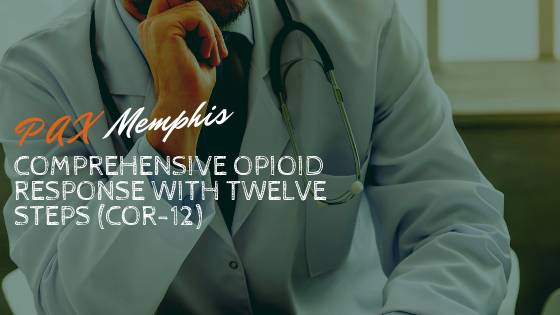For many years, the traditional addiction treatment approach was “mind over matter.” In other words, the general consensus was that with enough support and willpower, anyone could overcome addiction. However, the opioid epidemic and scientific research have challenged old ideas and set the standard for a new approach to addiction treatment. (Tramadol) Individuals seeking recovery from opioid drugs face serious obstacles in their journey to sobriety. For instance, withdrawal symptoms can be seemingly insurmountable and cravings for these drugs can continue for varying lengths of time. By combining medication with counseling, behavioral therapies, twelve step-based treatment, and individualized care, many people are able to sustain recovery as opposed to using traditional treatment methods.
Comprehensive Opioid Response with Twelve Steps (COR-12) treatment was originally founded by the Hazelden Betty Ford Foundation, offering the best, most effective evidence-based treatment available for opioid addiction. The COR-12 modality of treatment integrates Medication Assisted Therapy (MAT), behavioral/talk therapy, and a twelve step-based program of recovery.
Medication-Assisted Treatment
Medication-Assisted Treatment began as a desperate attempt to find a more effective way to treat opioid use disorders. By combining medication with counseling and behavioral therapies, many people are able to sustain recovery as opposed to using traditional treatment methods. MAT aims to prevent relapse, aid in long term sobriety, diminish cravings, and alleviate opioid withdrawal symptoms.
The FDA reports that MAT treatments are safe and effective when taken as prescribed and in combination with support and counseling. Due to the high numbers of fatalities that result from opioid use disorders in Memphis, Tennessee, MAT has become a popular plan of action among individuals seeking treatment.
Rather than focusing on physical discomfort, patients who receive medication-assisted treatment can shift their focus on making progress with their emotional and mental health while engaging in the COR-12 program.
COR-12 Treatment
The COR-12 treatment program, at PAX Memphis, integrates Medication-Assisted Treatment, a twelve step-based program of recovery support system, therapy, and an individualized treatment plan for each client. The COR-12 treatment program offers three possible pathways. Each pathway will include enhanced treatment services.
- No Medication Pathway – Patients may be treated with medication to prevent initial withdrawal symptoms and then gradually taper off within the first two weeks of the program.
- Buprenorphine/Naloxone Pathway – Patients will be given a combination of Buprenorphine and Naloxone medications to prevent withdrawal and cravings while engaging in supportive services over an extended period of time.
- Extended-Release Naltrexone Pathway – Patients will be administered an opioid receptor antagonist called Naltrexone through a monthly extended-release injection while patients participate in therapy and other treatment services.
Each of the three COR-12 pathways will include integrated treatment, recovery services, individualized treatment plans, and Pax Memphis’ clinically-led programming formatted to meet the individual needs of each client. Our addiction specialists at PAX Memphis will work closely with each client and his/her family members and loved ones to recommend the most appropriate COR-12 pathway. Clinical recommendations are generally based upon factors such as:
- Medical History
- History of Opioid Use
- Treatment/Recovery History
- Relapse History
- Co-occurring Mental Health History
- Support Network
- Recovery Environment
- Relapse Risk Factors
Once the patient has been assigned a medication pathway, the patient will begin the COR-12 program through the following phases:
Phase One: Inpatient Treatment
- Detox and a physician assigned medication pathway
- Individual/Group therapy
- Support group
- Introduction to Twelve Step groups, alumni services, and other recovery resources
Phase Two: Intensive Outpatient Treatment
- Monitoring/Adjustment of medications (as needed)
- Therapy, attending Twelve Step group meetings, finding a homegroup, getting a sponsor, developing daily recovery discipline, structured weekly schedule
- Re-establishing work, family, and friendly relationships
Phase Three: During the latter months of the program, patients will end therapy sessions while continuing participation in their opioid-specific support group.
- Consistency in work, school, and maintaining healthy relationships
- Medication continuation evaluation
Phase Four: Aftercare
- Aftercare individualized recovery plan is established
- Most medications are discontinued
- Continuing participation in the Twelve Step support group
- Utilizing family relationships to become a primary support system
COR-12 Treatment at Pax Memphis
At PAX Memphis Recovery Center, our individualized, boutique level of care combined with our dedicated addiction professionals understand the importance of providing the best possible care for all of our patients. The medical professionals at Pax Memphis will analyze each patient to determine which pathway caters best to the individualized care of each patient.
Our team of addiction professionals understands that individuals who are addicted to opiates have a hard time engaging in treatment services and connected with support when distracted by overwhelming opiate withdrawal and cravings. All three of the COR-12 pathways at Pax Memphis include individualized treatment and professional recovery services. Our team works closely with you, your family, and any other significant loved ones in your life to recommend and execute the most appropriate COR-12 pathway for you.
Medically Reviewed: September 25, 2019

All of the information on this page has been reviewed and verified by a certified addiction professional.










